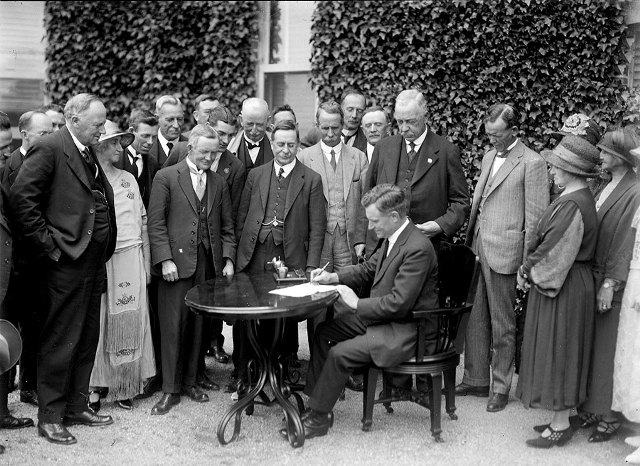 The Bruce-Page coalition adopted the ‘Men, Money, Markets’ policy for economic development within an imperial framework [photo: National Museum of Australia].
The Bruce-Page coalition adopted the ‘Men, Money, Markets’ policy for economic development within an imperial framework [photo: National Museum of Australia].
[This is an excerpt from an article published in October 2018 in The Round Table: The Commonwealth Journal of International Affairs.]
Language of Crisis
Today the economic stakes of Brexit are described by all parties using language of crisis, which begs the question of why economic associations are so crucial to these debates. ‘Dear loaf’ policies refer to economic (especially tax and tariff) policies which function on the premise of maintaining low prices for basic foodstuffs in order to maintain a stable working class and voter support. However, as authors such as Eva Namusoke have so thoroughly documented, there are layers beyond economics in any discussion of the Commonwealth in contemporary British politics, which often tend towards nostalgic and whitewashed views of the so-called Old Commonwealth. Imperial nostalgia can be a potent force for underscoring national prestige, or garnering support for a government coping with a loss of global hegemony. While this sort of nostalgia is far from novel, in a world where Britain is no longer a global hegemon and exerts less influence than it might wish in the workings of the EU, it is easy to see how imperial nostalgia has proven so tantalising to the UK’s more nationalistic political groups.
Modified memories of the Commonwealth which emphasise a hierarchical structure, with the UK in a leadership role as ‘first among equals’, are central to the Brexiteer rhetoric. Consider, for example, the claim by one Leave campaigner that: ‘Free market economics was pioneered by Anglo-Saxons and economic freedom has been proven to facilitate economic growth, development, prosperity and freedom, which alleviates poverty and creates more equality of opportunity’. While framed in neoliberal economic terms, such claims evoke UK leadership in both economic and racial terms, entwining narratives of economic prosperity with those of enlightenment and progress.
Such evocations delve into the emotionally charged realm of identity politics, though frequently masked in economic terms. Idealised memories of the Commonwealth allow racially demarcated policies and imperial nostalgia to be cast in progressive terms concerning Commonwealth trade and cooperation, while overlooking the majority of the organisation’s membership. Commonwealth economics, then, serve multiple purposes in Brexiteer rhetoric, from masking xenophobic policies, to emphasising the strength and centrality of Britain.
Contemporary rhetoric concerning Commonwealth economic coordination misrepresents the British attitude towards the Commonwealth leading up to the Ottawa Agreements, the last and most comprehensive instance of such coordination. For the UK, the 1920s were a period of economic malaise. The demobilisation of troops and industry and significant war debts slowed recovery from the First World War, and left a persistent level of unemployment in the UK. British economic policy across party lines was focused on unemployment relief measures at home and promoting free trade abroad. Based on assumptions of Britain’s strength as a free-trading export economy, British domestic, international, and imperial economic policy aligned to these two central goals. Domestically, public works projects, settlement of vacant land, industrial reorganisation, and unemployment insurance were key. Internationally the UK worked towards the return of gold standard currency and the perceived financial stability and recovery this would bring, in addition to advocating freer international trade and removal of the many wartime impediments to trade.
Imperial policies very much echoed these priorities, and are best summed up in the words of Australian statesman Stanley Bruce. In the opening session of the 1923 Imperial Economic Conference, Bruce described the priorities of the soon-to-be Commonwealth as ‘men, money, and markets’, which in practical terms were programmes of imperial settlement, imperial investment and development, and facilitated trade through preferential tariffs.
[Preston Arens is with the Department of History, University of Waterloo, Waterloo, Canada.]
Related articles
Eva Namusoke (October 2016) – A Divided Family: Race, the Commonwealth and Brexit
Vince Cable: On Brexit’s “inflated expectations” and the Commonwealth’s “great value”
Sir Peter Marshall on the Commonwealth, Brexit, trade and CHOGM (Video)



